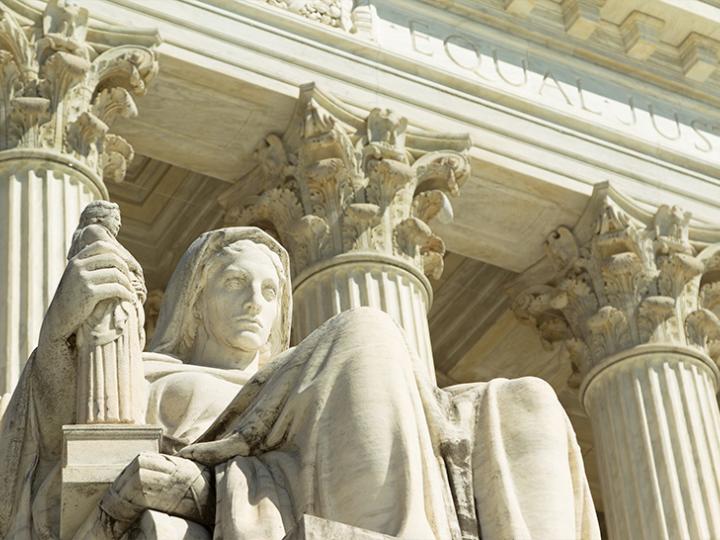Recently, in Arizona v. Navajo Nation, No. 21–1484 (June 22, 2023), Associate Justice Clarence Thomas, writing in concurrence, cited Restatement of the Law of Contracts, Restatement of the Law Second, Contracts, and Restatement of the Law Third, Trusts, and Associate Justice Neil M. Gorsuch, writing in dissent, cited Restatement of the Law Second, Contracts.
The case arose from an 1868 peace treaty between the United States and the Navajo Tribe that established the Navajo Reservation and implicitly reserved the Tribe’s right to use needed water from the reservation’s water sources. While facing a water-scarcity problem, the Navajos filed an action against, among others, the U.S. Department of the Interior and the Bureau of Indian Affairs, alleging a breach-of-trust claim arising out of the treaty and seeking “to ‘compel the Federal Defendants to determine the water required to meet the needs’ of the Navajos in Arizona and to ‘devise a plan to meet those needs.’” The U.S. District Court for the District of Arizona dismissed the Tribe’s complaint. The U.S. Court of Appeals for the Ninth Circuit reversed, holding, among other things, that the United States had a duty under the treaty to take affirmative steps to secure water for the Tribe.
The U.S. Supreme Court reversed the Ninth Circuit’s decision, holding that, while the treaty reserved necessary water to accomplish the purpose of the Navajo Reservation, it did not impose a duty on the United States to take affirmative steps to secure water for the Tribe. Associate Justice Brett M. Kavanaugh, delivering the opinion of the Court, clarified that “[t]he Navajos’ claim is not that the United States has interfered with their water access” but “that the treaty requires the United States to take affirmative steps to secure water for the Navajos—for example, by assessing the Tribe’s water needs, developing a plan to secure the needed water, and potentially building . . . water infrastructure—either to facilitate better access to water on the reservation or to transport off-reservation water onto the reservation.” The Court noted that the “Federal Government owes judicially enforceable duties to a tribe ‘only to the extent it expressly accepts those responsibilities,’” and “[w]hether the Government has expressly accepted such obligations ‘must train on specific rights-creating or duty-imposing’ language in a treaty, statute, or regulation.” The Court explained that its “precedents have stated that the United States maintains a general trust relationship with Indian tribes, including the Navajos,” but “unless Congress has created a conventional trust relationship with a tribe as to a particular trust asset, this Court will not ‘apply common-law trust principles’ to infer duties not found in the text of a treaty, statute, or regulation.”
Concurring fully with the majority opinion, Associate Justice Clarence Thomas wrote separately to discuss the “amorphous and seemingly ungrounded ‘trust relationship.’” He noted that the Court’s decades-long reference to “a general trust relationship between the United States and the Indian people” could be interpreted as referring to “the trust that Indians have placed in the Federal Government.” Justice Thomas cited Restatement of the Law Third, Trusts § 2 in explaining that the reference could also be understood as meaning the “relationship in which a trustee has legally enforceable duties to manage a discrete trust corpus for certain beneficiaries.” He observed that the Court had taken “steps to rectify this confusion” by pointing out that “the Federal Government is ‘not a private trustee’ but a ‘sovereign’” and that “any legal trusts established or duties self-imposed by the Government for a tribe’s benefit are ‘defined and governed by statutes rather than the common law.’” He argued, however, that, while the majority’s opinion in this case was also a step in the right direction, “the Court has also invoked the ‘trust relationship’ to shape at least two other areas of its Indian-law jurisprudence—with questionable results.” In one such area, he explained, “the Court has identified ‘the unique trust relationship’ with the Indians as the source of pro-Indian ‘canons of construction’ that are supposedly ‘applicable [only] in Indian law.’” Citing Restatement of the Law of Contracts § 505 and Restatement of the Law Second, Contracts § 206, Justice Thomas observed that the first cases to apply those canons relied on the principle that ambiguous treaty provisions should be construed against the drafting party, and that it was “unclear how the ‘trust relationship’ could justify freestanding pro-Indian canons that authorize courts to depart from the ordinary rules of statutory interpretation.”
In a dissenting opinion, Associate Justice Neil M. Gorsuch argued that the majority “reject[ed] a request the Navajo Nation never made”; instead of requiring the United States to take affirmative steps to secure water for them, the Navajo merely asked the United States to assess what water rights it held for them, and, if it misappropriated those rights, the Tribe asked the United States to create a plan to prevent it from doing so going forward. Justice Gorsuch explained that principles of contract interpretation, including the doctrine of unilateral mistake set forth in Restatement of the Law Second, Contracts § 201(2), “have long influenced the interpretation of Indian treaties,” and that “it [was] impossible to conclude that water rights were not included” in the treaty at issue in this case, because “the Treaty of 1868 must be read as the Navajo ‘themselves would have understood’ it.” He pointed out that “a fiduciary relationship to a specific group and complete managerial control over the property of that group . . . [gave] rise to a duty to account,” and “[n]ot even the federal government seriously disputes that it acts ‘as a fiduciary’ of the Tribes with respect to tribal waters it manages.”
Find the full opinion here.
